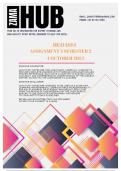, QUESTION 1
A) Concept of psychosocial
Psychosocial support in an educational context refers to the integration of psychological and social
elements within the learning environment to promote students' overall well-being and academic
success. This approach aims to address the emotional, social, and mental health needs of students,
ensuring they can cope with stress, build resilience, and develop positive relationships. It involves a
range of services, including emotional support, social skills development, academic guidance, and
mental health promotion. Teachers, peers, and the school community play a crucial role in
providing this support, which helps students navigate challenges such as anxiety, depression, and
social difficulties. By fostering a nurturing and supportive environment, psychosocial support
ensures students feel secure, valued, and motivated, contributing to their holistic development and
better academic performance.
B) Three evidence-based strategies
Providing emotional support to students in the classroom is essential for their emotional well-being,
social development, and academic success. Emotional support helps students feel valued,
understood, and capable of overcoming challenges. To effectively offer this support, educators can
adopt evidence-based strategies that promote a nurturing and inclusive classroom environment.
Three key strategies are active listening, creating a safe environment, and offering encouragement
and reassurance.
Active Listening is one of the most crucial strategies in providing emotional support to students. By
actively listening to students, educators show genuine interest in their thoughts, feelings, and
concerns. This involves paying full attention to the speaker, making eye contact, and providing
non-verbal cues like nodding to indicate understanding. Reflecting and clarifying what has been
heard ensures that students feel understood, which in turn fosters trust and openness. When
students feel heard and validated, they are more likely to share their concerns and seek help,
leading to improved emotional and academic outcomes. Research suggests that active listening
promotes better teacher-student relationships, which can reduce anxiety and increase students'
sense of belonging in the classroom.
Creating a Safe Environment is another fundamental strategy for emotional support. A classroom
where students feel emotionally secure encourages them to express their feelings without fear of
judgment or ridicule. This can be achieved by promoting respect, inclusivity, and kindness among
students, as well as setting clear rules against bullying or emotional harm. Confidentiality is another
important aspect of a safe environment, where students know their private matters will be
respected.
Studies have shown that students who perceive their classroom as a safe space are more likely to
engage in learning activities and less likely to exhibit behavioral problems, as they feel supported in
their emotional struggles. Finally, Offering Encouragement and Reassurance is a powerful way to
support students emotionally. Encouragement involves acknowledging students’ efforts,
highlighting their strengths, and providing positive feedback. Reassurance helps them believe that
their challenges are temporary and manageable. For instance, when a student is struggling with a




